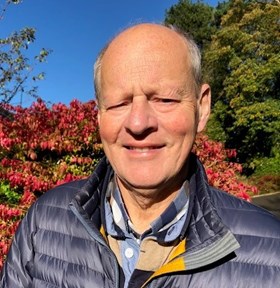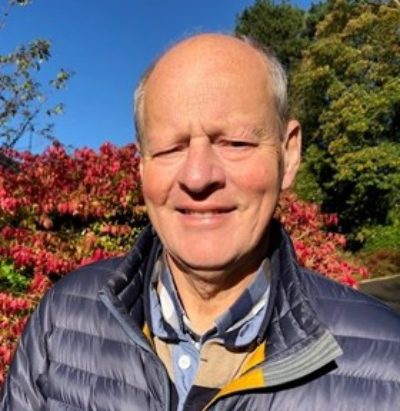Looking to chat with others who are going through surgery?
Our WhatsApp group is here. Talk to people who ‘just get it’.


Before I was diagnosed with pancreatic cancer, I enjoyed reasonably good health. I did have diabetes and the doctor said I should try and lose some weight, so I started doing park runs and took up cycling.
I was doing pretty well at both and was losing some weight, but then I realised that I was losing it a lot quicker than I had expected. I had a target of 92 kilos and when I reached that goal I was pleased, but then I went past my target and, at that point, I began to be concerned. At the time, I had a sore shoulder so I went to see my doctor about it. I had also noticed that my urine was getting very dark and I had a pain in my back and my stools really weren’t normal. What I was really concerned about was the feeling I had in my stomach – I knew something wasn’t right.
At the appointment with my doctor, I mentioned my other symptoms and said that I thought it was cancer. The doctor said that it probably wouldn’t be but that she would take some blood tests. At this point, it was late on a Friday afternoon and there was a long queue to see the nurse, so I said I would come back on Monday morning. On Monday when I passed my urine sample to the nurse, she asked me if my urine ‘was always that colour’ and took the sample straight to the doctor. She also took some blood tests. I was contacted the next day by my doctor who advised that there was an abnormality in either my gallbladder, kidneys or pancreas so, as a consequence, they set up an immediate ultrasound scan and further blood tests.
The doctor rang me to say that the scan had shown a growth in my pancreas and a further appointment was set up to discuss with him what the next steps were, and to ascertain how serious it was. A CT scan was set up for the next day and the doctor also advised that an appointment with the consultant had been arranged for the following Tuesday. When the consultant looked at the results of the CT scan, he advised that he needed to get me into surgery quickly. Thankfully, I was deemed fit for the complex surgery.
It only took me three weeks from being diagnosed to the operating table. I was told that it was going to be a pretty tough operation but at that stage I did not fully grasp what that actually meant. The operation took 10 and a half hours and the tumour was in a difficult place for the operating team to reach.
For me, the operation was totally devastating – it was really tough, physically and psychologically. During my career, I held a senior management job and was used to a lot of pressure but, for the first time ever, I was depressed and I felt like I couldn’t cope. I was offered some help with counselling as I was in a really dark place and struggling with it all. I just had to tell myself ‘you just have to get on with this, you just need to fight it’. With the support of a small set of close friends who called to take me out for gentle walks and coffee, I started to feel a little better each day. As time passed and by increasing the gentle exercise, I was able to cut down on my medication for the anxiety and depression.
My GPs and surgeon were both excellent. The specialist nurses referred to me were also very good. It takes a big team to get the operation done and everyone was very understanding and supportive. I couldn’t have asked for any more. I could have gone private but the care would have been no better. As a result, I have very high praise indeed for the NHS.
I’m a lot better now and I’m trying to live a normal life. I did have 6 months of chemotherapy after my operation which was pretty frightening. I had some side effects, mainly affecting my fingers and feet and also experienced hair loss, but it wasn’t as bad as I thought it would be. I did struggle though every morning to take the vast amount of medication.
After the operation, I struggled badly with managing my digestive system. In sharing this with my specialist nurse, she recommended that my doctor prescribe Creon (an enzyme replacement). This made a huge difference. It helped me build my strength up again because I could finally digest my food. It took some adjusting to but I can now judge the fat content in food and how much Creon I need to take. I take two in the morning with breakfast, three with my lunch, four with my dinner and two in the evening.
After about six months, I was able to get back on my bike again. Now a year after the operation, I’m cycling about 25-30 miles a week and I’ve set myself a challenge to cycle 100 miles in the Ride London race next year in support of pancreatic cancer. It will be a really big challenge for me but I plan to commence my training during the winter months.
The mental side, I think is the worst. If you can get around the mental issues then you’ve got a good chance. I realise how fortunate I am in surviving pancreatic cancer and that I’m able to get some normality back into my life. I used to have a job as a curriculum manager at a further education college. I retired at 51 and made a move into property development so I was running my own company at the time of diagnosis. That all had to take a back seat but I’m now currently actively involved again, albeit on a reduced scale and with less pressure.
I cannot stress enough the importance of a good support mechanism. It is critical to have family and friends around in times like this, especially in the first few months after the operation when you only want to be in the company of your immediate family and close friends. It’s not just the patients that suffer, it’s the whole family. I was fortunate to have good family, friends and my church around me. Once or twice a week, someone would come to get me out of the house and various friends would provide food parcels. Most importantly, they gave me a sense of hope and let me know that they cared about me. This was most reassuring.
I received lots of cards too which also meant a great deal to me. When you get a card, you realise that someone took the time to go to the shop, pick a card and write a nice message. However, one can’t just rely on other people – there is a point where you just have to get up on your own and do things for yourself, if at all possible. You need to grab hold of the situation. I was very, very fortunate in lots of ways – the tumour was detected early and I was able to have the operation quickly – within three weeks. In terms of pancreatic cancer, speed is of the essence.
Research is very much needed in this area so please support Pancreatic Cancer UK. If you have pancreatic cancer, there is hope – I am testimony to that.
If you know someone with the illness, please let them know you care.
I would urge anyone reading my story, that if they have concerns, to go to their doctor urgently. Don’t wait until it is too late. If in doubt, get checked out!
Our WhatsApp group is here. Talk to people who ‘just get it’.